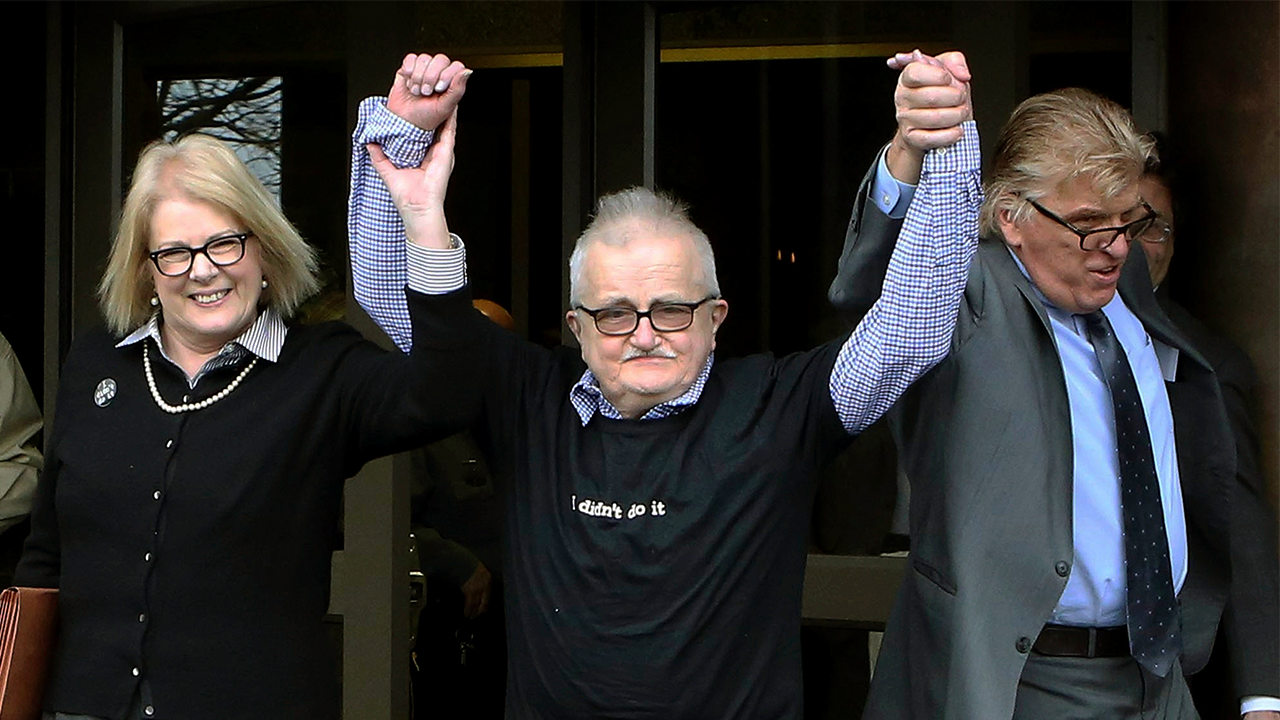Connecticut
Connecticut to award nearly $6 million to family of disabled man wrongfully imprisoned for murder conviction

Connecticut is set to pay nearly $5.9 million to the family of a disabled man who was wrongly imprisoned for more than two decades before he was freed in 2015 when his 1992 conviction in the murder and rape of an 88-year-old grandmother was overturned.
Richard Lapointe, who died at age 74 in 2020, had Dandy-Walker syndrome, a rare congenital brain malformation that his lawyers say was a factor in his false confession. Lapointe was never declared innocent, but his lawyers and the state attorney general’s office eventually agreed to settle after years of legal battles.
The state claims commissioner’s office on Jan. 2 set the money to be awarded to the family, although it still needs to be approved by the legislature. The claims commissioner’s office determines whether people can file lawsuits against the state or receive money under the state’s wrongful incarceration law.
Claims Commissioner Robert Shea Jr. said his office agreed that the award is “reasonable and appropriate.”
CONNECTICUT LAWYER INTRODUCES BILL THAT WOULD LEGALIZE SPORTS BETTING ON FLIGHTS TO, FROM STATE
In this April 10, 2015, photo, Richard Lapointe, center, raises his arms with Kate Germond, left, and Paul Casteleiro, both of Centurion Ministries, after he was granted bail and released at the Connecticut Supreme Court in Hartford, Connecticut. (AP)
Lapointe’s attorney, Paul Casteleiro, said the award is “a recognition by the state of the wrong it committed in prosecuting and imprisoning an innocent man. Sadly, Richard did not live long enough to witness his final vindication.”
“The award is by no means adequate compensation for what was done to Richard Lapointe,” Casteleiro said Friday, adding that the state destroyed his client’s life “for a crime he did not commit.”
The attorney general’s office said in a statement Friday that it “negotiated a resolution of this claim in the interests of all parties. This reflects that process.”
In 1987, Lapointe’s wife’s grandmother, Bernice Martin, was found stabbed, raped and strangled in her burning apartment in Manchester, Connecticut.
Lapointe was convicted in Martin’s murder in 1992 and sentenced to life in prison without the possibility of release. Key evidence in the case included Lapointe’s confessions during a nearly 10-hour interrogation by Manchester police.
His lawyers argued his mental disability attributed to him giving false confessions and that the confession was coerced without his lawyers present.

Lapointe was convicted of murder in 1992 and sentenced to life in prison without the possibility of release. (iStock)
The state Supreme Court ruled 4-2 in a 2015 decision that Lapointe was deprived of a fair trial since prosecutors did not disclose notes by a police officer that may have supported an alibi defense. Later that year, prosecutors said new DNA testing did not implicate Lapointe and all the charges were dropped.
Nobody else has been charged in Martin’s killing.
Lapointe was released from custody a short time later and exited the Hartford courthouse wearing a black T-shirt that read “I didn’t do it” as he threw his hands into the air in triumph.
“Of course I didn’t do it,” Lapointe said at the time. “That wasn’t me. I wouldn’t do nothing like that to nobody. I wouldn’t even kill my worst enemy.”
Casteleiro said the case against Lapointe destroyed his family, who shunned him.
BIDEN CLEMENCY FOR ‘NON-VIOLENT’ INMATES INCLUDES CONNECTICUT CHILD KILLER

The state Supreme Court ruled 4-2 in a 2015 decision that Lapointe was deprived of a fair trial. (iStock)
CLICK HERE TO GET THE FOX NEWS APP
Before Martin’s death, Lapointe and his wife, who has cerebral palsy, “were making a life together. They were doing okay,” Casteleiro said. But after his arrest, his wife divorced him, and he lost all contact with his son, who was young at the time.
After his release from prison, Lapointe began suffering from dementia, was placed in a nursing home in East Hartford and died after a battle with COVID-19, according to his lawyers.
Lapointe has been supported by several advocates, including the groups Friends of Richard Lapointe and Centurion, an organization Casteleiro works for that helps the wrongly convicted.
The Associated Press contributed to this report.

Connecticut
Three West Hartford Women Among Judicial Nominees Announced by Governor Lamont – We-Ha | West Hartford News

Gov. Ned Lamont on Monday announced the nominations of 20 jurists to serve in positions on Connecticut’s courts.
By Ronni Newton
Gov. Ned Lamont announced multiple judicial nominations on Monday that are being forwarded to the Connecticut General Assembly for approval, including Honorable William H. Bright, Jr. as an associate justice of the Supreme Court and the Honorable Robin L. Wilson as a judge of the Appellate Court, and among the 13 he also nominated to become judges of the Superior Court, three are from West Hartford.
The West Hartford residents who are nominees, all women, include Kaitlin A. Halloran, Angeline Ioannou, and Latonia C. Williams.
Halloran, 41, is a graduate of New York University and obtained her Juris Doctor degree from the University of Connecticut School of Law. Since the firm she co-founded in 2010, Halloran & Halloran, merged with BBB Attorneys in 2021, she has focused on litigation of complex cases, and has also maintained an active pro bono special education practice assisting families in navigating the system and accessing services,
Ioannou, 55, is a graduate of Sacred Heart University and obtained her Juris Doctor from Widener University School of Law in Wilmington, DE (now Widener University Commonwealth Law School). She has more than 25 years experience in the litigation of complex tort and medical malpractice matters involving wrongful death and catastrophic injury, and is managing partner of the Hartford office of Lewis Brisbois Bisgaard and Smith, LLP.
Williams, 41, is a graduate of Howard University and obtained her Juris Doctor degree from the University of Connecticut School of Law. As a partner at Shipman and Goodwin LLP, her practice focuses on commercial litigation matters in state and federal courts, including commercial bankruptcies, landlord-tenant disputes, and commercial foreclosures. She also serves on the State of Connecticut Judicial Branch Client Security Fund Committee and the board of directors for Statewide Legal Services of Connecticut, Inc.
“Nominating judges to serve on our courts is one of the most important responsibilities of a governor, especially because judges are the final authority on the interpretation of the law and the constitution, and for ensuring that justice is administered fairly and without prejudice,” Lamont said in a statement. “Judge Bright has been an excellent leader of our Appellate Court over these last four and a half years, and he has had an impressive career handling all types of cases both on the trial and appellate levels. Likewise, Judge Wilson is an incredibly well-respected member of Connecticut’s legal community, having served in the Superior Court for more than two decades. I am confident that these nominees each have the high standards and qualifications the people of Connecticut deserve to have serving for them on the bench.”
In addition to the three from West Hartford, the other 10 Superior Court judicial nominees announced by the governor on Monday are:
- David G. Bothwell, 55, of Fairfield
- Tracie C. Brown, 53, of Windsor
- Michael C. D’Agostino, 53, of Hamden
- Jesse Giddings, 43, of North Haven
- Diana M. Gomez, 42, of Easton
- Donald R. Green, 58, of Meriden
- Kevin C. Kelly, 65, of Stratford
- Daniel Shapiro, 58, of Westbrook
- Kevin Shea, 58, of Madison
- Yonatan Zamir, 48, of Woodbridge
According to Monday’s announcement by the governor, there were currently 22 judicial vacancies on the Connecticut Superior Court.
Lamont also is nominating two jurists to serve as family support magistrates (Benedict R. Daigle, 43, of Cromwell and LeeAnn Neal, 39, of Waterbury) and three (Michael L. Anderson, 54, of North Stonington; Christine Conley, 42, of Groton; and Colette Griffin, 66, of Newtown) as administrative law judges on the Workers’ Compensation Commission.
Like what you see here? Click here to subscribe to We-Ha’s newsletter so you’ll always be in the know about what’s happening in West Hartford! Click the blue button below to become a supporter of We-Ha.com and our efforts to continue producing quality journalism.
Connecticut
12-year-old shot multiple times by driver after throwing snowball at car in Connecticut

Police in Connecticut have launched a manhunt for a suspect who opened fire on a pair of kids, striking a 12-year-old multiple times, after the children hit the gunman’s car with a snowball last week.
Officers in Hartford responded to a shooting around 7:15 p.m. Wednesday and discovered the injured 12-year-old, according to Hartford Police.
The victim and their 11-year-old friend had been having a snowball fight outside when one of the snowballs struck a car passing by, police said.
The vehicle circled around to chase the children down and the driver fired a gun at the kids, police said at a news conference on Thursday.
The 12-year-old sustained non-life-threatening gunshot wounds and was taken to Connecticut Children’s Medical Center. The 11-year-old was not injured.
No suspect had been arrested by Sunday and police are continuing to investigate.
Snowballs have proven to incidentally stir trouble for years, even as annual snowfall countrywide has decreased.
In early December, football fans went wild and made it rain snowballs on members of the San Francisco 49ers during a game against the Buffalo Bills on their home turf in snowstorm-laden Buffalo, NY. Bills fans were back at it again in late January during a game against the Kansas City Chiefs.
One town in Wisconsin took a different approach and banned snowball throwing outright.
Connecticut
Face the Facts: Discussing how clemency is granted in the US

Earlier this week, a man convicted in the killing of an 8-year-old boy and his mother in Bridgeport in 1999 has been granted clemency by now former president Joe Biden.
Senator Richard Blumenthal was our state attorney general at the time. He was one of many lawmakers shocked by this pardon.
He spoke with NBC Connecticut’s Mike Hydeck about his take on the pardon.
Mike Hydeck: Senator, welcome back. Earlier this week, you talked about how you were attorney general back in 1999 when this case was tried. You said this case actually changed Connecticut laws. How?
Richard Blumenthal: This case changed Connecticut laws because the victims here, an 8-year-old boy and his mom, Karen Clarke, were potential witnesses in a very serious crime. They were murdered so that they could not testify in court, and as a result, Connecticut adopted a witness protection program named after BJ Brown and his mom, Karen Clarke. And I was shocked and appalled that clemency was accorded to the culprit in this case, who was convicted in state court of conspiracy to murder and then in federal court of federal drug crimes, and that’s why I am pushing again for reforms to the pardon system, which led to clemency to Adrian Peeler, the convicted murderer here.
Mike Hydeck: How do we go about changing the pardon power of the president so this doesn’t happen again? It’s clear that he had served time for the state charge and he was still in prison on the federal drug charge, but it seems like, is there a pardon board that overlooks these or does President Biden just get handed one and then he signs it? It seems as if somebody read past the headline, we would have figured this out.
Richard Blumenthal: That’s really the question of the moment, and a very important question. You know, the pardon power in our federal government is accorded absolutely without any checks and balances, to the president of the United States. It is a relic, in a sense, of the pardon power exercised by the monarchy in England, and the founders gave it to the president without any requirements for transparency or accountability. In the state of Connecticut, we have a Board of Pardons and Paroles, 10 people working full time with set criteria relating to the impact on the victim and the opinion of the prosecutors and the severity of the offense. There’s no such board at the federal level, and so it is completely within the discretion of the president whether to accord clemency, commutation of sentences, reprieve for fines. And that’s why I am proposing that we actually impose some guardrails on the president of the United States, requiring an explanation, at the very least, some explanation for why pardon has been accorded, and some notice to the prosecutors. For example, in the Peeler case, the Department of Justice had an opportunity for the victims, the Clarke family, to come forward and present their opinion, their views, on whether there ought to be clemency. So providing some guardrails at the federal level, as we do in Connecticut and other states do at the state level is really critical, and in the long run, I’m proposing a constitutional amendment that would curb or cut this absolute power of the president. It has to be a constitutional amendment because the pardon power is part of our federal Constitution. But I think the time has come for this absolute power on the part of the president of the United States to be eliminated.
Mike Hydeck: Senator, is there any way to revisit the Peeler case now that Biden is out of office? Or is that pretty much a done deal because of the power of the pardon?
Richard Blumenthal: We probably should look into why there was this pardon for Adrian Peeler. But we also should keep in mind that President Trump granted pardons to some 1,500 convicted or accused rioters who assaulted police officers, many of them injuring severely those police officers, and in some cases actually killing, causing their deaths. So the pardon power used to grant clemency to those rioters who cause those kinds of injuries and death is also part of the picture here, and we should move forward to restrict and cut and curb the presidential powers. And at the same time, perhaps look at why the pardon for Peeler was granted. But the answer to your question is, there’s probably nothing to do right now, actually, to reverse that decision, because it has already been made and there’s no review, which again, points the need for reform here.
Mike Hydeck: Senator Blumenthal, we have to leave it there. We’re looking forward to when that legislation is drafted. We’d like to have you back on when it is.
-
/cdn.vox-cdn.com/uploads/chorus_asset/file/25835602/Switch_DonkeyKongCountryReturnsHD_scrn_19.png)
/cdn.vox-cdn.com/uploads/chorus_asset/file/25835602/Switch_DonkeyKongCountryReturnsHD_scrn_19.png) Technology1 week ago
Technology1 week agoNintendo omits original Donkey Kong Country Returns team from the remaster’s credits
-

 Culture1 week ago
Culture1 week agoAmerican men can’t win Olympic cross-country skiing medals — or can they?
-

 Culture7 days ago
Culture7 days agoBook Review: ‘Somewhere Toward Freedom,’ by Bennett Parten
-

 World1 week ago
World1 week agoChrystia Freeland, Justin Trudeau’s ‘Minister of Everything,’ Enters Race to Replace Him
-

 Education1 week ago
Education1 week agoReport Projecting Drop in Freshman Enrollment Delivered Incorrect Findings
-

 News1 week ago
News1 week agoCNN liable for defamation over story on Afghanistan 'black market' rescues
-

 World1 week ago
World1 week ago‘Fields were solitary’: Migration raids send chill across rural California
-

 World1 week ago
World1 week agoCommission claims slashing of foreign offices still under negotiation













